Foods to not feed your dog…
Most of us love to spoil our best friends with foods and treats. We do however need to be very careful as to not hurt our buddies in the spoiling process.
Here are some foods to avoid :
Apple Seeds – The casing of apple seeds are toxic to a dog as they contain a natural chemical (amygdlin) that releases cyanide when digested. This is really only an issue if a large amount was eaten and the seed were chewed up by the dog, causing it to enter its blood stream. But to play it safe, be sure to core and seed apples before you feed them to your dog.
Avocado – Avocados contain Persin, which can cause diarrhea, vomiting, and heart congestion.
Baby food – Baby food by itself isn’t terrible, just make sure it doesn’t contain any onion powder. Baby food also doesn’t contain all the nutrients a dog relies on for a healthy, well maintained diet.
Cooked Bones – When it comes to bones, the danger is that cooked bones can easily splinter when chewed by your dog. Raw (uncooked) bones, however, are appropriate and good for both your dog’s nutritional and teeth.
Candy and chewing gum – Not only does candy contain sugar, but it often contains Xylitol, which can lead to the over-release of insulin, kidney failure, and worse.
Cat food – Not that they would want this anyway, but cat food contains proteins and fats that are targeted at the diet of a cat, not a dog. The protein and fat levels in cat food are too high for your dog, and not healthy.
Chocolate – You’ve probably heard this before, but chocolate is a definite no no for your pup. And it’s not just about caffeine, which is enough to harm your dog by itself, but theobromine and theophylline, which can be toxic, cause panting, vomiting, and diarrhea, and damage your dog’s heart and nervous systems.
Citrus oil extracts – Can cause vomiting.
Coffee – Not sure why you would give your dog coffee, but pretty much the same applies here as to chocolate. This is essentially poison for your dog if ingested.
Corn on the cob– This is a sure way to get your dog’s intestine blocked. The corn is digested, but the cob gets lodged in the small intestine, and if it’s not removed surgically, can prove fatal to your dog. Additionally, too much corn kernels can upset the digestive tract as well so be cautious to not feed too much.
Fat trimmings – Can cause pancreatitis.
Fish – The primary fish that you need to be careful about are salmon and trout. Raw salmon can be fatal to dogs if the fish is infected with a certain parasite, Nanophyetus salmincola. The parasite itself isn’t dangerous to dogs, but is often infected with a bacteria called Neorickettsia helminthoeca, which in many cases is fatal to dogs if not treated properly. If diagnosis occurs early on, the dog has a great chance of recovering. Cooked salmon is fine as it kills the parasite.
Grapes and raisins – This is one that lots of dog owners are unaware of. Grapes contain a toxin that can cause severe liver damage and kidney failure. We’ve heard stories of dogs dying from only a handful of grapes so do not feed your pup this toxic food.
Hops – An ingredient in beer that can be toxic to your dog. The consumption of hops by your dog can cause panting, an increased heart rate, fever, seizures, and even death.
Human vitamins – Some human vitamins are okay to use, but the key is comparing the ingredients (all of them – active and inactive) to the vitamins your vet subscribes for your dog (often you can get the human equivalent for much less money). Make sure there’s no iron – iron can damage the digestive system lining, and prove poisonous for the liver and kidneys.
Liver – In small amounts, liver is great but avoid feeding too much liver to your dog. Liver contains quite a bit of Vitamin A, which can adversely affect your pup’s muscles and bones.
Macadamia nuts – These contain a toxin that can inhibit locomotory activities, resulting in weakness, panting, swollen limbs, and tremors as well as possible damage to your dog’s digestive, nervous, and muscle systems.
Marijuana – Not that you would pass the bong to your dog, but if you do, you should know that it can adversely affect your pup’s nervous system and heart rate, and induce vomiting.
Milk and dairy products – While small doses aren’t going to kill your dog, you could get some smelly farts and some nasty cases of diarrhea. Why? Dogs are lactose intolerant (as are an increasing number of humans today), and don’t have enough of the lactase enzyme to properly digest dairy foods. If you really need to give them dairy, look into lactose-free dairy products.
Mushrooms – Just as the wrong mushroom can be fatal to humans, the same applies to dogs. Don’t mess with them.
Onions and chives – No matter what form they’re in (dry, raw, cooked, powder, within other foods), onions are some of the absolute worst foods you could possibly give your pup (it’s poisonous for dogs, and its even worse for cats). They contain disulfides and sulfoxides (thiosulphate), both of which can cause anemia and damage red blood cells.
Persimmons, peaches, and plums – If you live in an area that is home to persimmon, peach, or plum trees, look out. Persimmon seeds and peach and plum pits can cause intestinal obstruction and enteritis. You’ll want to make sure there aren’t any wild persimmon or other fruit trees that produce seeds growing in your backyard. If you notice your dog pooping all over the place, and see a bunch of seeds or pits in their waste, you’ll need to break out the saw and chop down some trees.
Rhubarb, and tomato leaves – These contain oxalates, which can adversely affect the digestive, nervous, and urinary systems.
Raw fish – Another vitamin B (Thiamine) deficiency can result from the regular consumption of raw fish. Loss of appetite will be common, followed by seizures, and in rare instances, death.
Salt – Just like salt isn’t the healthiest thing for humans, it’s even less healthy for dogs. Too much of it can lead to an imbalance in electrolyte levels, dehydration and potentially diarrhea.
String – While not a food itself, foods can often contain or be similar to string (ie. meat you’ve wrapped for the oven). If your dog were to eat a string, it could get stuck in their digestive tract and cause complications.
Sugar – This applies to any food containing sugar. Make sure you check the ingredient label for human foods – corn syrup (which is a less expensive form of sugar or glucose) is found in just about everything these days. Too much sugar for your pup can lead to dental issues, obesity, and even diabetes.
Tobacco – A major toxic hazard for dogs (and humans). The effects nicotine has on dogs are far worse than on humans. Nicotine can damage your pup’s digestive and nervous systems, increase their heart rate, make them pass out, and ultimately result in death.
Xylitol – A sugar alcohol found in gum, candies, baked goods, and other sugar-substituted items, Xylitol, while causing no apparent harm to humans, is extremely toxic to dogs. Even small amounts can cause low blood sugar, seizures, liver failure, even death for your pup.
Yeast (on its own or in dough) – Just like yeast rises in bread, it will also expand and rise within your pup’s tummy. Make sure they don’t get any. While mild cases will cause gas, lots of farting, and discomfort – too much of it could rupture their stomach and intestines.




